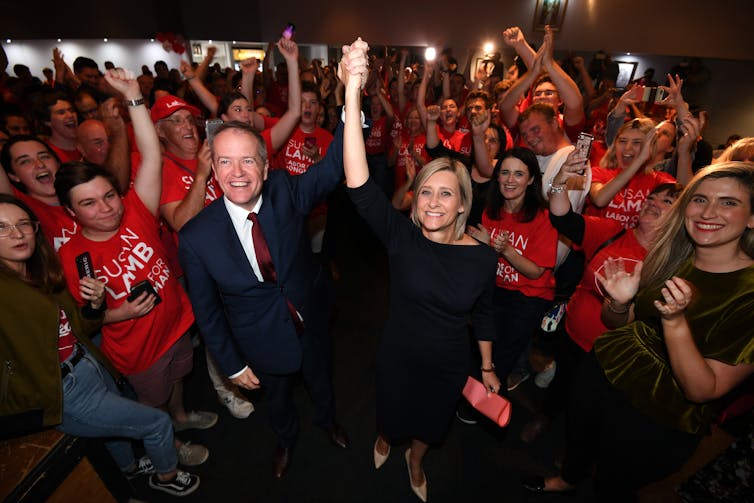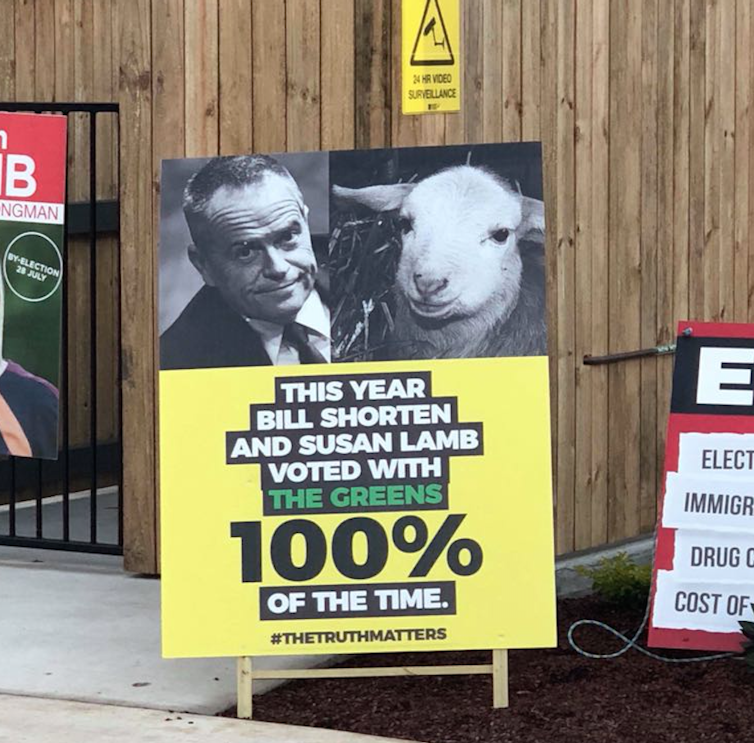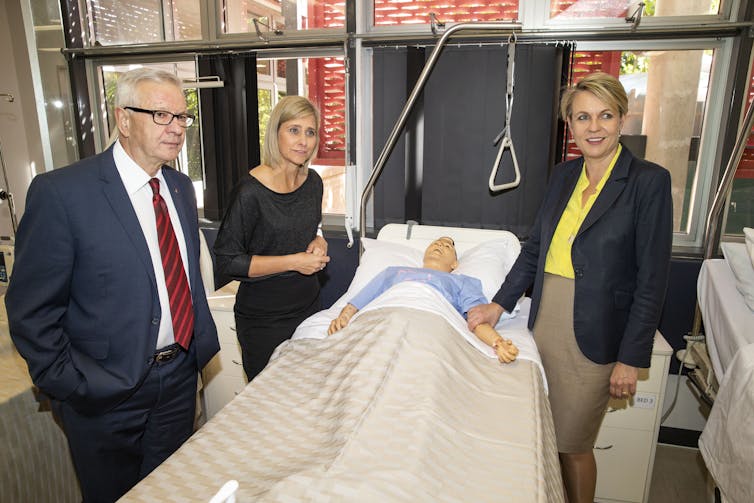
AAP/Dan Peled
Adrian Beaumont, University of Melbourne
Federal byelections were held in five seats on Saturday, four Labor-held and one held by the Centre Alliance’s Rebekha Sharkie. Labor and Sharkie retained all of their seats. I will go through these seats starting with the closest.
In the Tasmanian seat of Braddon, Labor’s Justine Keay defeated the Liberals’ Brett Whiteley by a 52.7-47.3 margin, a 0.5% swing to Labor since the 2016 election. Primary votes were 38.9% Liberal (down 2.7%), 37.0% Labor (down 3.0%), 11.0% for independent Craig Garland, 4.8% for the Shooters and 4.0% for the Greens (down 2.8%).
In the Queensland seat of Longman, Labor’s Susan Lamb defeated the LNP’s Trevor Ruthenberg by an emphatic 55.4-44.6 margin, a 4.6% swing to Labor. Primary votes were 40.7% Labor (up 5.3%), 28.6% LNP (down a large 10.4%), 16.1% One Nation (up 6.7%) and 5.0% Greens (up 0.6%). The LNP’s drop was 3.7% greater than One Nation’s gain.
In the South Australian seat of Mayo, Sharkie defeated the Liberals’ Georgina Downer by a massive 58.6-41.4 margin, a 3.6% swing to Sharkie. Primary votes were 45.2% Sharkie (up 10.3%), 36.3% Liberal (down 1.5%), 9.4% Greens (up 1.4%) and 6.0% Labor (down 7.6%). Sharkie is a popular incumbent, while Downer’s candidacy had problems.
Read more:
Poll wrap: Coalition’s record Newspoll losing streak, and Rebekha Sharkie has large lead in Mayo
With the Liberals not contesting, the Western Australian seats of Perth and Fremantle were easily retained by Labor with over 62% of the two-party vote against the Greens. Perth was the only Super Saturday byelection to be caused by the resignation of the sitting member; in the other four byelections, the sitting member successfully recontested after resigning due to the citizenship fiasco.
Postal votes have not yet been counted in any of the byelections, and they are likely to help the Liberals. In particular, the small swing to Labor in Braddon will probably become a small Liberal swing when postals are added.
Seat polls slightly understated the Labor vote in Braddon, and slightly overstated Sharkie’s vote in Mayo once postals are factored in. In Longman, there was a large error, with two polls taken in the penultimate week both giving the LNP a 51-49 lead. A Newspoll taken in the final days gave Labor a 51-49 lead, but Labor is likely to win at least 54% of the two party vote after postals.
I believe Labor’s relatively poor performance in Bradddon is probably due to Tasmanian factors, in particular state Labor’s large loss at the March Tasmanian election.
These byelection results will be a huge boost for Opposition Leader Bill Shorten, who has been under pressure owing to poor head-to-head polling vs Malcolm Turnbull, especially as Labor’s national lead has narrowed. Shorten is now very likely to lead Labor to the next election.
At the June 2017 UK general election and the July 2018 Mexican presidential elections, left-wing leaders, respectively Jeremy Corbyn and Andrés Manuel López Obrador (AMLO), were well-known to the public before the election campaign began. Corbyn and AMLO both made big gains in the polls during the campaign, then outperformed their polls on election day.
Read more:
Conservatives suffer shock loss of majority at UK general election
In late May, Sky News ReachTEL polls gave the Liberals a 54-46 lead in Braddon and a 52-48 lead in Longman. The results in these byelections could be a sign that Australia may follow the UK and Mexico. Although Turnbull and the Coalition have substantially reduced Labor’s lead in the national polls, it could be a different story as the election approaches.
Read more:
ReachTEL polls: Labor trailing in Longman and Braddon, and how Senate changes helped the Coalition
National Ipsos: 51-49 to Labor (50-50 respondent allocated)
A national Ipsos poll, conducted for the Fairfax papers on July 18-21 from a sample of 1,200, gave Labor a 51-49 lead, a two-point gain for the Coalition since late June. Primary votes were 39% Coalition (up four), 34% Labor (down one), 12% Greens (steady) and 6% One Nation (steady).
The respondent allocated preference measure showed a 50-50 tie, a reversion to the normal pattern where the Coalition does a point better in respondent allocated preferences than last election preferences. In June, respondent allocated preferences had Labor ahead by 54-46.
55% approved of Turnbull’s performance (up five), and 38% disapproved (down six), for a net rating of +17, up 11 points. Shorten’s net approval dropped three points to -16. Turnbull led Shorten by a massive 57-30 as better PM (51-33 in June).
Both Turnbull’s approval rating and his better PM rating were his highest since March 2016. While Ipsos gives Turnbull better ratings than other polls, these ratings for Turnbull are still very strong.
![]() Labor led the Coalition by 48-41 on health (50-35 in June 2016). Labor also led on education 49-42 (51-37 previously) and the environment 49-35 (46-28). The Coalition led on the economy 60-33 (58-29), and on asylum seekers 45-41 (47-32 previously).
Labor led the Coalition by 48-41 on health (50-35 in June 2016). Labor also led on education 49-42 (51-37 previously) and the environment 49-35 (46-28). The Coalition led on the economy 60-33 (58-29), and on asylum seekers 45-41 (47-32 previously).
Adrian Beaumont, Honorary Associate, School of Mathematics and Statistics, University of Melbourne
This article was originally published on The Conversation. Read the original article.


